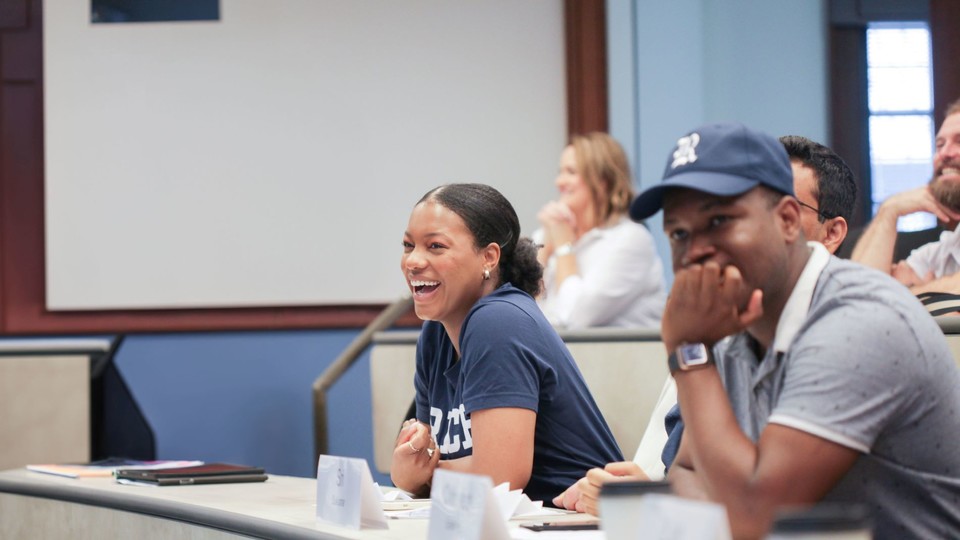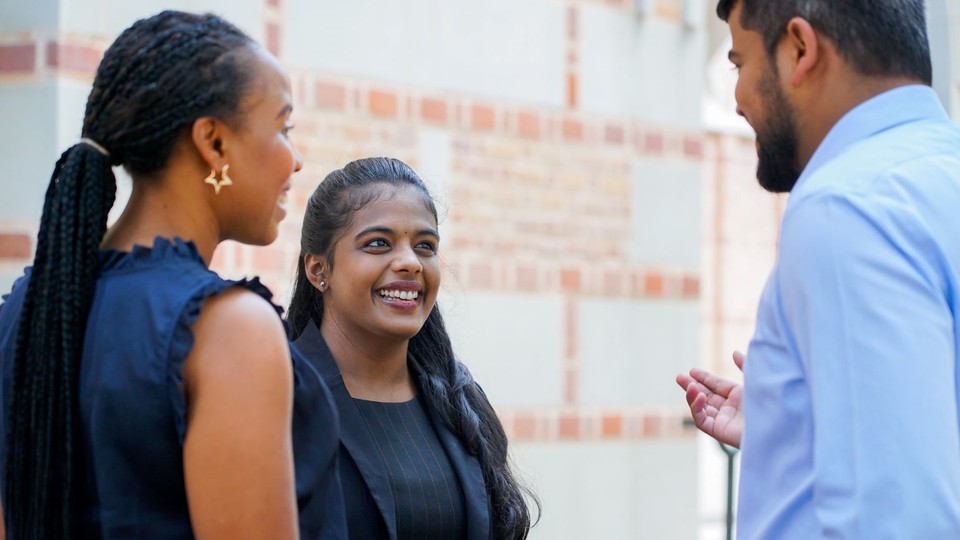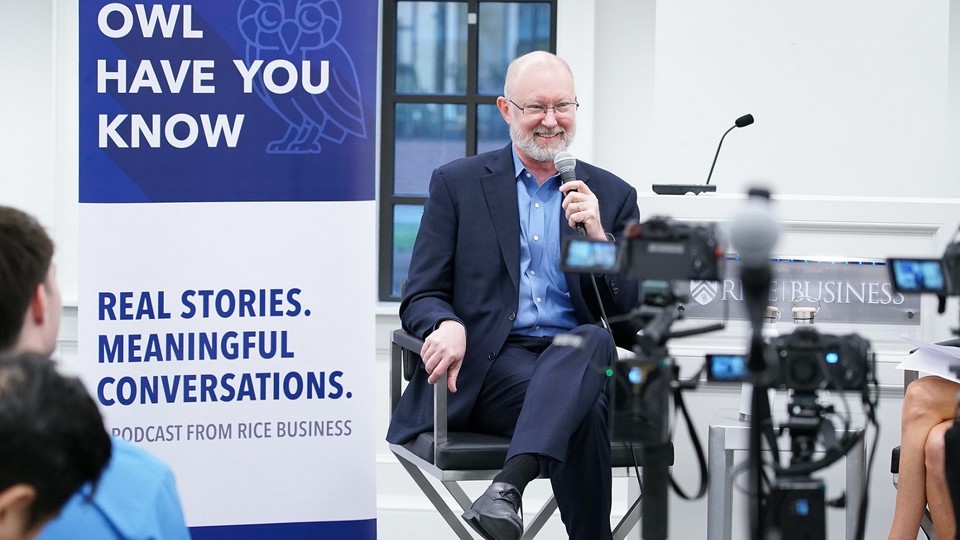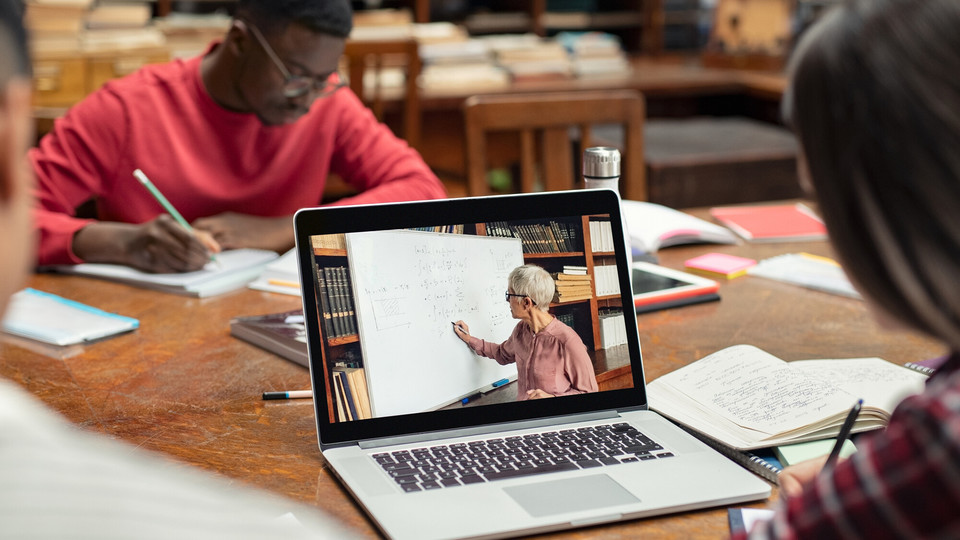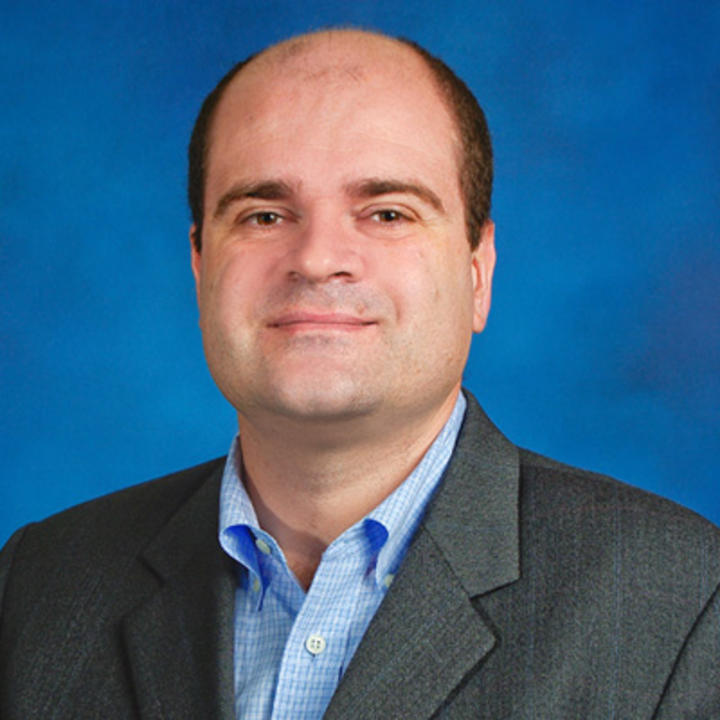
Poets&Quants’ 2026 World’s Best MBA Programs For Entrepreneurship
Rice Business climbs to No. 7 in the 2026 MBA entrepreneurship ranking, rising five spots and standing out for strong support, resources and outcomes for startup minded MBAs.
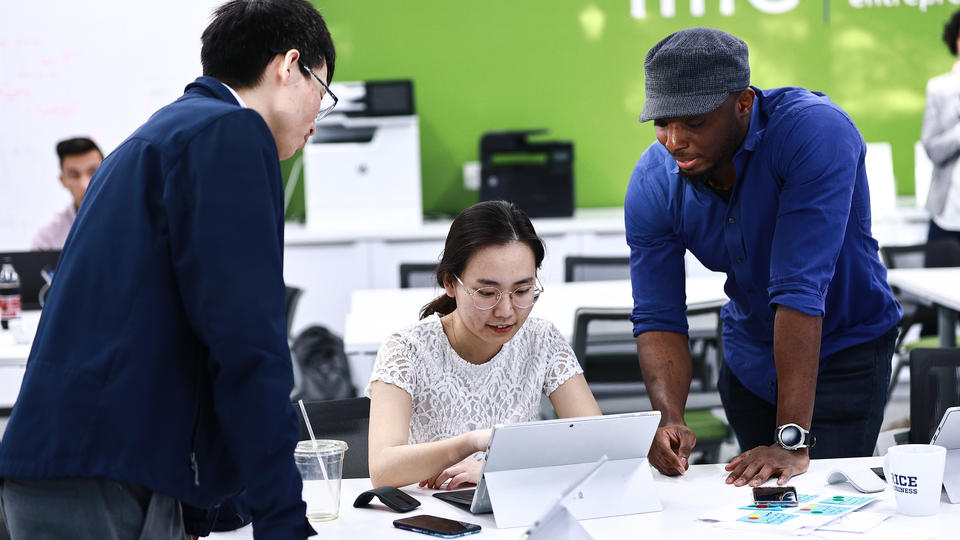
Princeton Review Ranking: Best MBA & Undergrad Entrepreneurship Programs
Which universities and colleges are best at teaching entrepreneurship? The Princeton Review offers insights with a 40-point survey.

5 Reasons To Apply Early to a Rice MBA as a Working Professional
Planning matters. Apply early to the Rice Business Professional, Hybrid or Executive MBA to secure your seat, coordinate employer support, build your network and start the program with confidence.

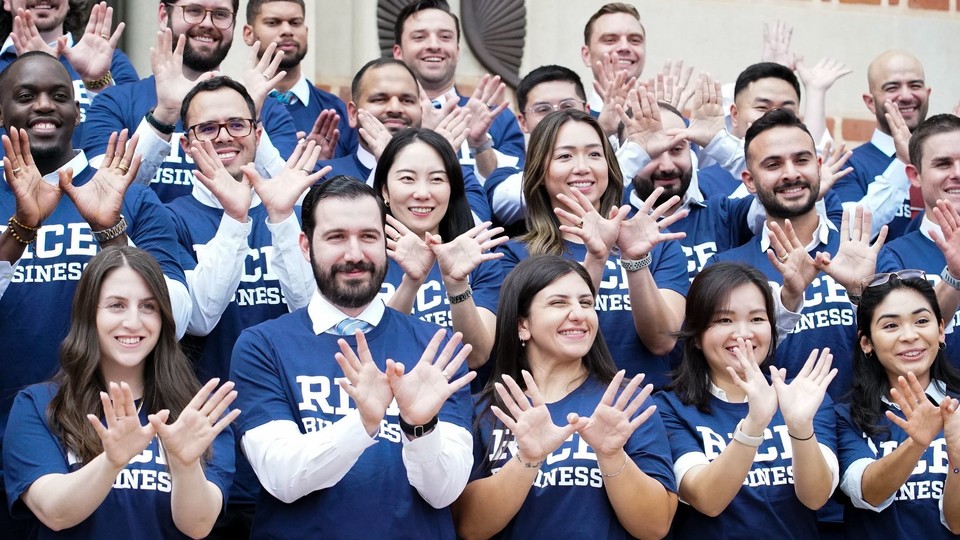
You plan ahead for your clients, your team and your company. It makes sense to do the same for your MBA.
When you’re ready to advance your career, broaden your network or take on a new challenge, timing can make all the difference. That’s why we encourage working professionals to apply early to Rice Business.
Whether you’re applying to the Professional, Hybrid or Executive MBA program, applying early gives you a stronger start. Here’s how.
1. Secure Your Seat
Our admissions team reviews applications on a rolling basis, which means the earlier you apply, the more seats are available — and the better your chances of securing one.
As the cycle progresses, space becomes limited, so an early application helps you avoid unnecessary competition.
2. Smoother Career Transition

Applying early gives you — and us — time to plan. You’ll have space to map out your academic schedule, think through workload and family logistics and even build in rest or vacation before classes begin.
In short, early applicants typically start the program with fewer last-minute pressures and a clearer sense of what’s ahead.
Interested in Rice Business?
3. Earlier Employer Conversations
If you’re seeking tuition support or schedule flexibility, you’ll want to start those internal conversations well before deadlines arrive.
An early application gives you room to work through your company’s approval process, and we can provide guidance or documentation to support you.

4. Connect With Our Community Sooner
From information sessions to networking events to campus visits, getting involved early helps you understand how the Professional, Hybrid or Executive MBA fits your goals. The earlier you begin engaging with faculty, staff, students and alumni, the more grounded you’ll feel when classes start — and the faster your network will grow.
5. Less Stress, More Prep
We know you’re juggling a demanding career — and often, family life or other commitments.
Applying early brings clarity sooner. You’ll have more time to prepare, plan and make your decision with confidence, rather than rushing at the end of the cycle.
No matter which Rice MBA program you’re considering, here are some more tips to help you submit your best application and kickstart your journey at Rice Business.
Applications for our Professional MBA, Hybrid MBA and Executive MBA programs are now open — start your application and take your career to the next level today!
You May Also Like
Keep Exploring
The Hidden Bias Behind Ratings feat. Professor Sora Jun
Season 5, Episode 20
Sora discusses her research on the hidden bias of gig worker ratings and what she loves most about teaching at Rice.
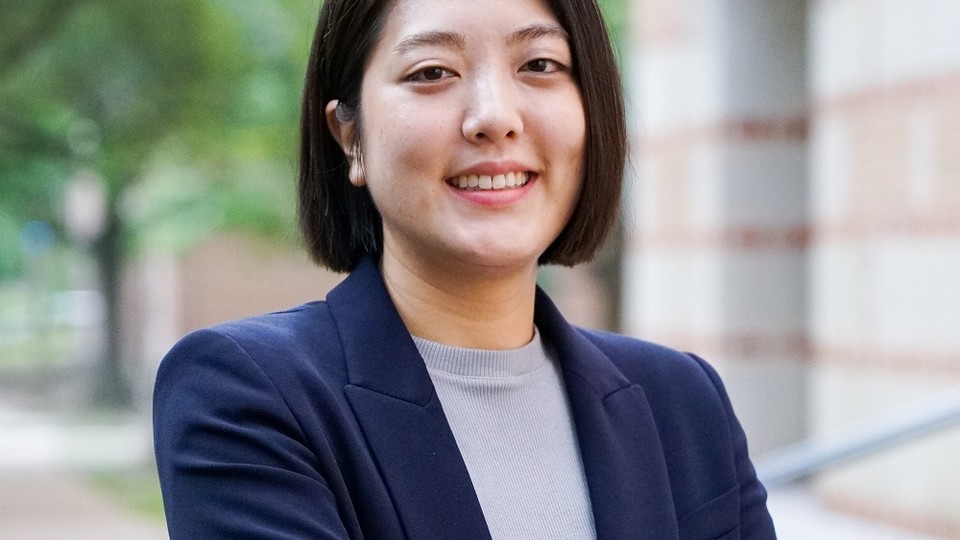
Owl Have You Know
Season 5, Episode 20
How does something as simple as a five-star rating system reveal subtle biases?
When she’s not teaching MBA and undergraduate students at Rice Business, Sora Jun, Assistant Professor of Management – Organizational Behavior, studies the hidden forces that shape how we see and treat one another. Her work explores how our minds process inequality and how even small design choices, like switching from stars to thumbs-up icons, can make systems fairer.
Host Brian Jackson ’21 sits down with Sora to discuss her research on the hidden bias of gig worker ratings, what she loves most about teaching at Rice, the findings of her latest paper and how her background has shaped her work.
Subscribe to Owl Have You Know on Apple Podcasts, Spotify, Youtube or wherever you find your favorite podcasts.
Episode Transcript
-
[00:00]Brian Jackson: Welcome to Owl Have You Know, a podcast from Rice Business. This episode is part of our Up Next series, where faculty, researchers and alumni weigh in on the trends currently shaping the business.
Today, we're joined by Dr. Sora Jun, assistant professor of management and organizational behavior at Rice Business. Sora teaches across the MBA, undergraduate, and Ph.D. programs, and her work has been published in leading journals. Dr. Jun studies the hidden forces that shape how we see and treat one another — from the ways people navigate power and privilege across social hierarchies to how subtle biases show up in something as simple as a five-star rating. Her work uncovers how our minds process inequality and how even small design choices, like switching from stars to thumbs-up icons, can make systems fairer.
Dr. Jun, welcome to Owl Have You Know.
[00:55]Sora Jun: Thank you so much for having me.
[00:58]Brian Jackson: Well, you've done so much. And really, what I want to know is your journey, starting from studying finance in Toronto to becoming a researcher in organizational behavior.
[01:09]Sora Jun: Yeah. So, I decided to enroll in a business program — a commerce program is what the Canadian schools call it — because I was really interested in understanding, like, how the world works. And I think, back then, I thought the biggest mover of people's behavior was money. And so, that's why I enrolled in a business program. But I actually found that a lot of the classes I was taking were not really answering the questions that I was hoping to get answers for.
So, I ended up doing a minor in sociology, which I think was a much better fit for my interests back then. I then learned about what research is through my organizational behavior professor, who basically, kind of, plucked me out of the class and suggested that I work for her as a research assistant. And I still work with her. Her name is Dr. Katy Decelles.
And so, that's how I got into the world of research, was really just taking classes that I found interesting and then just digging deeper into that without really thinking about, like, jobs, which I probably should have thought about. But thankfully, I found my way into what I think fits my kind of interests much better. So, that's how I got into research.
[02:20]Brian Jackson: So, you ended up in Toronto, but before, you were raised moving from different places, right?
[02:25]Sora Jun: Yeah. My earliest memories are my family in Buffalo, New York. So, my family was there until I was seven, even though I was born in Korea, like I moved as soon as I was born. And then my family moved back to Korea, so I did elementary school and middle school in Korea. And then my sister had been born in the U.S. And so, she moved back to Buffalo by herself to study for high school, because public schooling was free. And my parents thought that I might want to go through a similar path, but they knew they wouldn't be able to, like, afford for me to study in school in the U.S. without a citizenship. So, they applied for Canadian immigration where my aunt lived. So, I ended up living with my aunt's family and did high school. And then I went to college in Canada. I know that's very complicated, but yeah, circumstances led me to move in different places.
[03:21]Brian Jackson: Hey, it sounds complicated, but then I think of, like, my friend group that's everyone's stories are like that. So, your background moving across, has it led to influence the questions that you're asking or the kinds of research that you're drawn to?
[03:35]Sora Jun: Yeah, I think so. So, I think, at the core of all of my research lies, like, this idea of social identity. And I think that was a big part of my upbringing. So, for example, when my family moved back to Korea when I was, like, seven, eight-ish, I looked Korean, but I didn't speak Korean. But I understood most of the Korean that was being spoken. I think that was really weird for everybody around me because they would just assume that I was like them, but I wasn't really.
And then when I moved back to Canada to study, I didn't have as much of a Korean accent in my English, but my vocabulary was stuck at, like, a seven-year-old's vocabulary. And so, that was, I think, also really weird for people to, kind of, understand what was going on with me.
And so, I really experienced that daily and got used to the different environments. But I think that just, kind of, gave me, like, a different way of seeing, like, how groups form and what that identity means. Like, what my Korean identity means for me versus other people or my Asian identity and so on. So, I think it did have an impact, for sure.
[04:41]Brian Jackson: So, you're a student. You are working with research. When did it click, that, “Okay, now I want to teach?”
[04:48]Sora Jun: So, I didn't even have any teaching experience until my first job at UT Dallas. I think I had always had this idea that I am responsible for, like, mentoring younger Ph.D. students. So, there was some training and mentoring there, but I don't think I really seriously thought about the implications of teaching undergrads or MBAs until I first started teaching. And then I found a lot of joy and fulfillment in doing that, but I just fell into it in a lucky way — especially what I teach at Rice, is really close to what I do in my research. And so, I think it's very difficult to often reach the public audience with academic research. But I feel like I'm able to do that, often in a deep way with students, curating what I think is important research, like cutting-edge research in the areas that I study, to different levels of students. And I feel like I'm making an impact in that way, which I really, really enjoy.
And I think, also, a lot of the students who end up taking my class, kind of, find comfort in understanding and making more sense of their lived experiences in a more, you know, like, research-based way.
[05:58]Brian Jackson: And that in itself is a full-time job, on top of you're trying to do research, write papers, which I think is a segue into some of the research that you've done on the subtle systemic forms of bias. What drew you specifically into studying these small but consequential ways inequality shows up?
[06:17]Sora Jun: I think a lot of it is just, like, by my training. So, for example, like, the very first research project that I worked on, I think, was much more specific to how you manage your own social identity. So, I had a paper that ended up being published, but it started out as, like, an undergrad thesis, on how racial minorities basically erase cues that signal their race when they're applying for jobs to have a better chance at, you know, not being discriminated against and getting those interviews and jobs.
And so, I don't know if I was specifically initially focused on the, sort of, discrimination part, but I think it became a, sort of, automatic implication of, like, thinking about how your own social identity impacts how people react to you and respond to you. And a big part of that is discrimination, not just in the, sort of, negative way, but also in the positive way.
So, like, some people, just based on their identities, might be given the benefit of the doubt or, like, be presumed to be competent and all these things. So, yeah, that's probably how I got into it. Yeah.
[07:24]Brian Jackson: So, resumes. Like, what were the items that gave folks away? Was it affinity groups or geographic location, basic things like that?
[07:34]Sora Jun: So, it would often be in the names, like their first names or last names. Even if… so, let's say, like, my name is Sora Jun, like, some people might want to erase a name like that in the, kind of, Asian-ness by, you know, saying, like, SJ Jun, you know, like, even if the Jun, kind of, stays, like, pretty Asian.
But also, we looked at affiliation to ethnic groups. So, in an experiment we did, we, kind of, manipulated the degree of, like, what we call whitening, erasing racial cues in resumes and names and affiliation with student groups.
And so, the, kind of, takeaway from that paper was that, first, ethnic minorities, they are sensitive to discrimination, so they do tend to erase racial cues in their job packet when they apply for jobs to, kind of, avoid discrimination. But we also ran a field experiment where we varied the degree of whitening of resumes and applied for real jobs to look at the actual callback rates for those resumes. And we found that the more the resumes were whitened, meaning, like, they had fewer and fewer racial cues, the more likely the companies were to call the applicant back for an interview.
And we also actually had varied what kind of organizations these fake but real-looking resumes were sent to. And so, half of the organizations had the language in their, kind of, job postings that they value diversity and they welcome diversity. They appreciate it. And in the other half of the organizations that we sent our resumes to, those organizations didn't have any of that language. And we find that it doesn't matter what the organization says. The more a resume is whitened and has fewer racial cues, the better applicant's chances are to getting an interview, is what we found in that paper.
[09:19]Brian Jackson: How interesting! Even with how most companies have, what, an AI system that does a cursory run through that was happening?
[09:29]Sora Jun: So, this was, like, way before the age of AI, because it was a project that I had started when I was an undergrad student. But, yeah, I'm not sure about the implications of AI with that. Like, I think what you might be referring to is, like, the, kind of, blinding of identities, is that what you're talking about?
[09:48]Brian Jackson: Mm-hmm. That would just be interesting to know. I was curious. Well, I guess the timing here is everything, so this is way before that.
[09:54]Sora Jun: Yeah. But it is an interesting question. I do get that question a lot in my classes as well, like, can we just take away all the identifiers? Well, the research, at least the most recent research, like, in the past couple of years, not by myself, but other scholars, shows that it's not always beneficial to race cues either. It's, like, a much more sensitive and, kind of, delicate process, where it might be helpful if an organization has maybe had a lot of problems with bias and discrimination before. But if an organization already values diversity, truly not in a performative sense, then making these identifiers blind is not actually going to help.
[10:34]Brian Jackson: So, you've done a study on the gig worker ratings — which for those who don't know what gig worker ratings are, you might have to define — and the racial bias you uncovered in five-star systems. If you could just walk me through what that study looked like.
[10:47]Sora Jun: Yeah. So, this study did look at gig workers, but I don't think it's really limited to just gig workers. So, the starting point of this project was that a lot of online platforms that do hire gig workers, like Uber or Taskrabbit, use customer ratings to decide which workers will get more work and how much they'll get paid through their algorithms. But a lot of research before us has shown that there is a racial bias or racial discrimination in how customers rate these workers.
And so, generally, the pattern is that white workers tend to get better ratings and more pay than non-white workers. And so, we were trying to see if we could reduce that bias and discrimination by making a structural change specifically to how the workers are rated. Because a lot of these, sort of, platforms use a five-star rating scale, we wanted to look at whether switching to dichotomous, like thumbs-up or thumbs-down scale, might help reduce that gap.
[11:48]Brian Jackson: And so, did it ultimately reduce the gap? I’m curious.
[11:51]Sora Jun: Yes, it did. Yeah. So we were able to get data from, like, a home services online platform. And that company had made a pretty abrupt switch from a five-star rating scale to a thumbs-up/-down scale. So, none of the workers or the customers really knew that that change was coming. And what we're finding from their data is that, before the change, so, when the company was using a five-star rating scale, there is a racial gap in ratings, which also leads to a racial gap in the workers’ earning. So, for example, non-white workers were making, like, 91 cents to a dollar that the white workers were making. And after they made that switch to thumbs-up/-down scale, that gap is eliminated. So, there are no differences in the mean values of ratings for non-white versus white workers. And also, the income gap also was eliminated.
[12:46]Brian Jackson: And then, ultimately, the customer experience — unchanged, right? Did they show anything ultimately with the product?
[12:53]Sora Jun: No. So, we didn't find any evidence of that. But that was one of the concerns with the study design from the real data from the company. So, like, one thing that gave us comfort or, I guess, confidence in our results was that all of these gig workers were already vetted for, before they could be on the platform. And so, there was already, like, a test of quality beforehand. But we also ran a follow-up experiment to hold that quality constant. So, even… and we found again, like, support for predictions and replicating what the field data showed, with an experiment that held the quality of the workers constant.
[13:30]Brian Jackson: So, how do you balance the fairness of the gains of a binary system with the loss of nuance?
[13:36]Sora Jun: Yeah, I think that's a really tricky part. I do think it is a challenge. If we were to, like, imagine changing all these numerical rating scales to dichotomy scales, like, we would lose a lot of the fine-grained information. So, it probably depends a lot on the context. Like, I think, from our study, what we were finding was that the ratings using a five-point scale were already quite inflated, so there wasn't actually a ton of fine-grained information to be had from even the five-point scale information. So, like, everybody's ratings were between, like, a 4.5, for example, to a 5. This is just an example.
So, that's, kind of, one thing to keep in mind, is maybe assessing whether the fine-grained information is actually being produced from what you think is a good rating scale you have. Other things we've talked about as an authorship team were, like, it might be possible to use dichotomous skills when it's appropriate and ask for different dimensions of quality rather than just, like, lumping it all into, kind of, one question. Even though the cost of that would be, like, the strain on the customers, but that could be one way to at least increase more nuance about the quality of the work and workers.
[14:48]Brian Jackson: In talking about advantaged versus disadvantaged, from your side, why does framing matter so much when talking about pay gaps or wealth disparities?
[14:58]Sora Jun: So, we know from prior research that framing matters. Like, past research has found that any sort of gap or inequality could be described in at least one of two ways. So, it could be described as the powerful group having more power or the less powerful group having less power.
And a number of researchers have found that the way we frame the same inequality matters in how people understand what the causes of inequality are, who they really focus on when they're thinking about the inequality, and what kind of policies they support when trying to close those gaps. So, for instance, when you describe the gender pay gap as women earning less than men, compared to what is the logically equivalent framing of men earn more than women, people are more likely to focus on women as the cause of that pay gap. So, they're thinking, like, what are women doing to earn less than men? When, really, in a specific context, the issue could be more about the structure or the system, or it could be, like, men are doing something else or men are being treated in a different way to create that gap.
And so, framing of inequality matters, because even though what is being talked about is logically equivalent for an advantage or disadvantage frame, people understand it to be very different. And then they focus on different, I guess, objects.
[16:23]Brian Jackson: Yeah, it's so interesting. So, why do you think wealth inequality is often described in neutral terms while gender and racial gaps are framed as disadvantages?
[16:34]Sora Jun: Yeah. So, this is a question that my collaborators and I looked at in this paper called “Chronic Frames of Inequality.” And what we hypothesized about the differences between the different domains of inequality was that people have different conceptions of how fair or legitimate these inequalities are. And that perception of fairness also has implications for whether an advantage frame is more comfortable for people to use versus the disadvantage frame. And it gets quite technical after this.
[17:04]Brian Jackson: Yeah, I know.
[17:05]Sora Jun: What we find is that people generally think that race and gender inequalities are unfair. They often think that these identities are essential to people or more essential than, like, how much wealth or education you have.
So, that's the first part of it. And then we had all these predictions about how the perceptions of the legitimacy of the inequality might impact the framing. And so, when an inequality is considered unfair or illegitimate, it's in the interest of people on both sides of that inequality to frame it as a disadvantage, right? So, if you are, kind of, benefiting from these illegitimate or unfair hierarchies that you, kind of, have an understanding that it's unfair, it's much better not to draw attention to what you're getting more of, right? It doesn't feel great.
And this is, I guess, again, especially a case if you think that is coming out of some sort of unfair system, right? Also, on the other side of this is, if you are disadvantaged from this system of what you see as an unfair system of inequality, it's also, sort of, in your best interest to frame it as a disadvantage because any sort of remedies to fix that inequality will be more in the form of giving you or your group more things to correct for it than to bring the top down, which you might care about, but not as much as, like, your group being pulled up, right? That's, like, one side of it is that…
And the opposite is true when you generally think that the inequality is fair. So, if you think that you, like, won all these awards for really legitimate reasons, you know, like, you did well, like, you had a lot of effort and talent involved, it's actually pretty good to highlight that part of it, rather than, like, other people not doing as well because they might not have had those things, right?
Whereas, if you think that you are, kind of, losing out because of the fair reason, you might not want to call it out as much, right? Like, you don't really want to highlight your…
[19:06]Brian Jackson: [inaudible 19:05].
[19:07]Sora Jun: Exactly. And so, I know I talked about more of an individual-level example there, but connecting it back again to this idea of, like, what people consider a fair or legitimate system of hierarchy, people generally think that class and equality is your wealth, your income is a fair system, even though, again, there's also a lot of evidence that it’s not actually fair. But people think it's more fair than at least race and gender inequalities. We find evidence that that idea of perceived fairness is what drives people to either not prefer to use any type of frame or if they are preferring a frame, it's the advantage frame.
[19:42]Brian Jackson: So, as a leader, or let's say, like, as an educator, what do we do? How do we adjust our language, our vernacular, when we address and approach inequality in the workplace?
[19:53]Sora Jun: Right. So, this is something that my other collaborator, Taylor Phillips, and I had thought about a lot when we were looking at academic journal articles doing the exact same chronic framing as, like, newspaper articles or lay people. And I find it very difficult to give definitive prescriptive advice.
So, I think my advice would be to do a self-check. Like, do I have this tendency to chronically frame in one way rather than the other? And then just try to frame it the other way. See if it's even possible to do that. And then, kind of, reflect on what the implications of that other frame might be.
[20:31]Brian Jackson: Going to shift a bit to anti-Asian discrimination. You know, you're working on a paper currently. I think it's going to be potentially out when this episode is released.
[20:41]Sora Jun: Hopefully,
[20:42]Brian Jackson: What inspired you to dig into this?
[20:44]Sora Jun: Yeah. So, one of my biggest interests is really understanding complex hierarchical systems, how our conceptions of intergroup dynamics or relationships between different groups can really change once we stop dichotomizing our more complex social hierarchies. So, one, kind of, obvious example of this is the racial hierarchy in the U.S. So, a lot of research on race in the U.S., specifically, has really focused on comparing the experiences of white people versus, usually, it's Black people, but often, like, racial minorities as a, sort of, monolith. There's more and more research coming out that separates the different racial minority groups. But I had always been interested in understanding, like, where Asians, sort of, fit into this dynamic of race in the U.S.
Obviously, because of my own Asian identity, I think this is one of the first questions I had as a grad student when I started to read more about race and, like, not really seeing that information about, like, what is happening to race. Like, how do these theories apply to Asian people and so on?
And so, that's, kind of, how it got really started. And then I really started to think about the implications of Asian Americans being in a, sort of, intermediate status group, having fewer privileges and advantages than white Americans, but more so than Black and Hispanic individuals.
And so, my collaborators and I, we had theorized that one, sort of, implication of that might be that Asians simultaneously doing well and having these advantages might obscure the disadvantages and discrimination that they experience, which led to that project.
What we were theorizing about was this idea that, when people try to recognize some sort of event as discriminatory, there's some research showing that people, kind of, have a schema or an idea of what discrimination looks like. They have a prototype of, like, “This situation fits into my understanding of discrimination. This is happening.”
We were theorizing that, because Asian Americans also have these simultaneous racial advantages, along with their disadvantages that people wouldn't really think about Asian individuals as, kind of, prototypical victims of discrimination.
[23:03]Brian Jackson: You know, working through this paper, talking through the research, having other authors that you're working with, has this made you reflect on your own experience and even the experience of those close to you?
[23:16]Sora Jun: I think so. When you ask that question, I think the first thing that comes to mind is my own relationship with my Asian identity, which was, kind of, complicated, just because I did move around a lot. And I think it actually took me a while to really feel like I had enough legitimacy in standing and studying this in some ways because I felt like I didn't really the real, like, Asian American experience, given that I have been in so many different circles and I'm hearing so many different stories about what it means to be Asian for different people.
But I think really embracing that insecurity, almost, was useful because I think it just made me dig in deeper and realize, like, that might be part of that Asian experience is, like, feeling like there's so many different kinds of Asian experiences. I'm sure this is similar for other groups as well, but I think I've just become more appreciative of just asking people, like, “What's this been like for you?”
[24:15]Brian Jackson: Yeah. And you're pulling qualitative data. You're asking people their experiences. You're building that identity and piecing it together, right?
[24:24]Sora Jun: Yeah.
[24:24]Brian Jackson: Any big questions you want to explore, looking ahead five to 10 years?
[24:29]Sora Jun: I think I'm really interested in shedding more light on the advantage side of Asian Americans. It's, kind of, interesting.
I have a sense that it's almost easier to publish research that showcases the disadvantages of Asians. And I think people… the audience finds that a little more comfortable to take in. But my idea of, and what the research has said about Asian Americans’ position in the racial hierarchy in the U.S., is that they're in this in-between space. And so, there's not a lot of research on how Asians experience their advantages, which I think has a lot of other implications as well. Like, I don't think people think of Asians as, like, prototypical beneficiaries of the systems of racism. And they might not be the most benefiting group, but they still benefit more than some other groups, right?
So, like, it's that kind of nuanced “advantaging” side that I am more interested in and think it's important to explore further. Another question that I always have is, like, thinking beyond the context of race, like, what other hierarchies have this more fine grain, like, more than two-group situation?
[25:40]Brian Jackson: Interesting. Okay, so you're going to be busy the next five to 10 years.
[25:45]Sora Jun: Yeah, but it's fun work.
[25:50]Brian Jackson: So, you teach across several programs here at Rice — the MBA, Ph.D., and now the new Virani Undergraduate business program. What has that experience been like for you? And how does teaching undergraduates compare to working with MBA students or even doctoral candidates?
[26:07]Sora Jun: Yeah, I think it's really exciting. I just like the fact that I could teach all these different levels. And I find it challenging, a lot of times, to talk with undergrads who might have less experience and they might be more, like, interested in the theory part of things. And then on the other hand, like, talking to Executive MBAs who have, like, so much experience, it's just a very different group of people that I end up having access to. Like, I often see my role as a teacher more as a facilitator than, like, a teacher, like, sharing wisdom. I'm like, I'm connecting all the science about these topics to you all who have these, like, life experiences.
And so, just the fact that I get to teach this, like, wide range of students and, kind of, also hear about their perspectives, I find that really, really exciting.
[26:56]Brian Jackson: When your students leave your classes, be it undergrad or EMBA, what's the one thing you hope they carry with them into their careers?
[27:04]Sora Jun: I do think, like, one thing that's just important in general as, like, a functioning human being. But I also find, you know, like, it's hard to practice this all the time. It's just recognizing that your reality is not going to be the same as the other person's reality, even in the same situation.
And so, just giving yourself that room and, kind of, grace to be compassionate about yourself, but also for another person's understanding of what's happening. I think that's really important. And I have found that, a lot of our students, I hear their experiences and how they've tackled different situations and I'm like, “You sound like a great manager. Like, I would love to work with you, you know, if you ever become a professor.”
And I think that's, kind of, what I'm noticing, is that what I find the commonality of those, kind of, students who I like to think really, really shine and have, like, already demonstrated in practice. Like, I think the connecting thread is that they're really, really good at perspective taking and just, like, not assuming that other people are experiencing the world in the same way that they are.
[28:06]Brian Jackson: Yeah, it's leading with empathy.
[28:09]Sora Jun: Yeah. That's a great word. I could have just said that.
[28:12]Brian Jackson: No, no, I'm a good summarizer. That's what I'm here for. Thank you, Sora, for joining us today on Owl Have You Know.
[28:22]Sora Jun: Thank you so much for hearing me out.
[28:27]Brian Jackson: Thanks for listening. This has been Owl Have You Know, a production of Rice Business. You can find more information about our guests, hosts, and announcements on our website, business.rice.edu.
Please subscribe and leave a rating wherever you find your favorite podcasts. We'd love to hear what you think.
The hosts of Owl Have You Know are myself, Brian Jackson, and Maya Pomroy.
You May Also Like
Rice Business ranked No. 1 for graduate entrepreneurship by Princeton Review for seventh consecutive year
The Rice Business School at Rice University has secured the No. 1 ranking in graduate entrepreneurship education for the seventh year in a row, as named by The Princeton Review in partnership with Entrepreneur magazine.
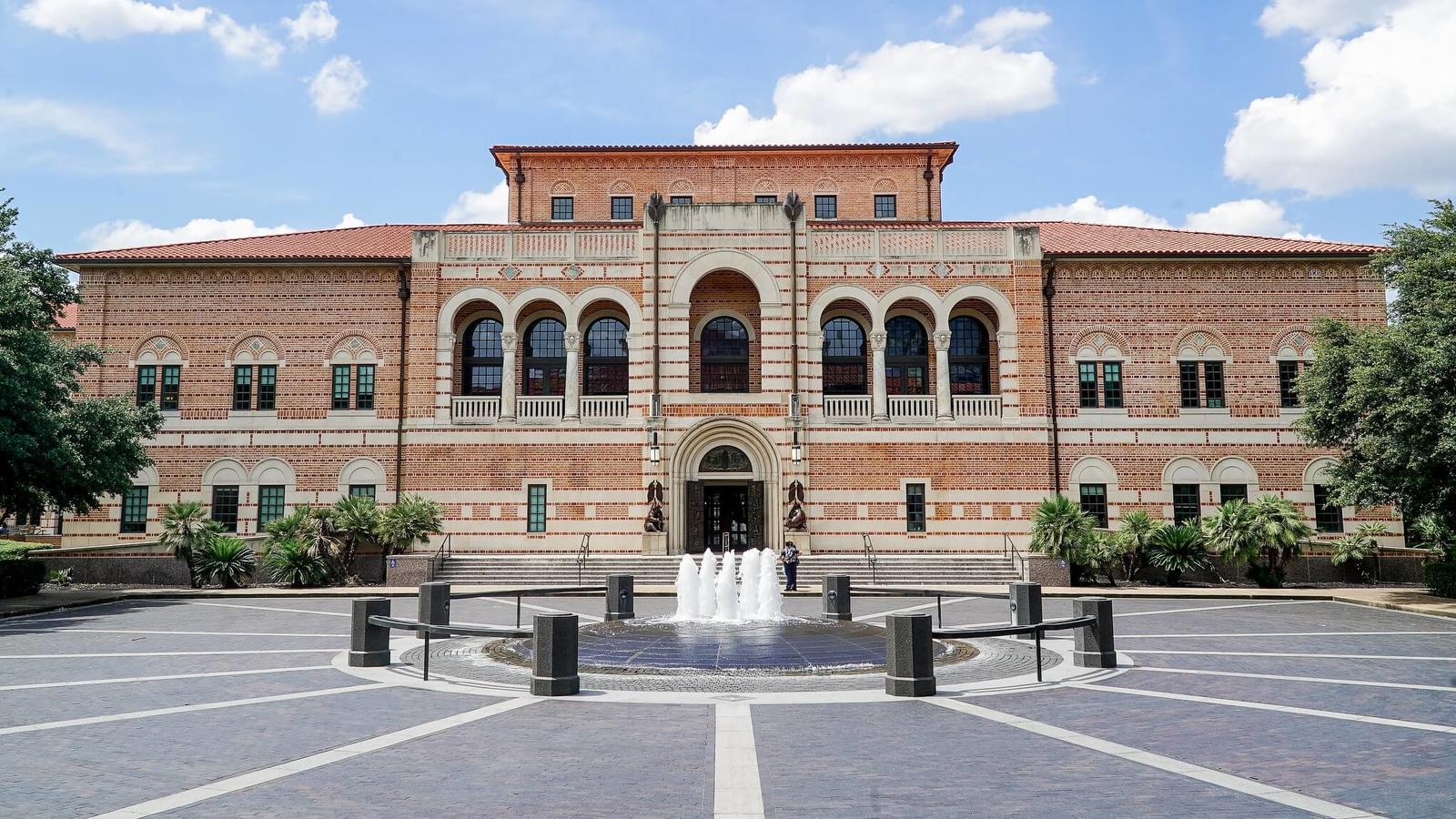
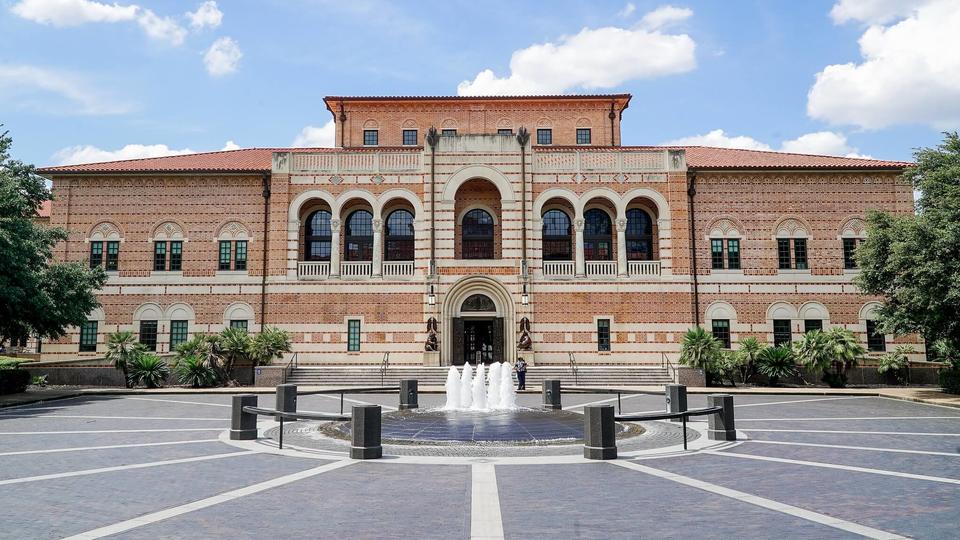
The Rice Business School at Rice University has secured the No. 1 ranking in graduate entrepreneurship education for the seventh year in a row, as named by The Princeton Review in partnership with Entrepreneur magazine. This sustained leadership reflects the school’s enduring commitment to innovation, venture creation and the cultivation of an entrepreneurial environment to build talent.
“Earning this top ranking once is a milestone, but achieving it seven years straight is unprecedented and speaks volumes about our community, our curriculum, our programs, our faculty and our students,” said Peter Rodriguez, dean of Rice Business. “We’re honored to be recognized yet again and remain deeply committed to equipping our graduates, both graduate and undergraduate, with the mindset, skills and networks to launch and grow successful ventures.”
“Innovation isn’t just something we celebrate at Rice when a new ranking comes out,” said Yael Hochberg, head of the Rice Entrepreneurship Initiative and the Liu Idea Lab for Innovation and Entrepreneurship (Lilie) and the Ralph S. O’Connor Professor in Entrepreneurship and Finance. “It’s the standard we hold ourselves to every single day.”
Why Rice Business continues to lead
- Specialized curriculum: Rice Business offers one of the country’s most comprehensive entrepreneurship specializations within its MBA program, enabling students to focus deeply on venture creation, startup strategy and growth-oriented leadership. In addition to the graduate programs, undergraduate students also have the option of pursuing a minor in entrepreneurship.
- Robust entrepreneurial ecosystem: Anchored by Lilie, which is celebrating its 10th anniversary this year, and by the Rice Alliance for Technology and Entrepreneurship, the university’s entrepreneurial ecosystem provides direct access to mentors, investor networks, seed funding and pitch competitions, including the Rice Business Plan Competition, celebrating its 26th year and hosted by Rice Alliance, and the Napier Rice Launch Challenge, hosted by Lilie.
- Location advantage: Nestled in Houston’s dynamic business environment, Rice students benefit from proximity to corporate headquarters, energy-technology hubs, venture capital activity and a vibrant startup scene — fueling live-deal experience and networking opportunities.
- Student-driven success: Each graduating cohort (both graduates and undergraduates) leaves with not only a degree but exposure to launching, scaling or working in high-growth ventures. The interplay of coursework, experiential programs and community engagement fosters an entrepreneurial mindset.
“It’s an honor that Rice has been recognized consistently as the top school for entrepreneurship,” Hochberg said. “To continue the legacy we’ve created, we need to lean into our entrepreneurial mindset even more to push boundaries, support bold ideas and reinvent what’s possible. Innovation is part of our DNA.”
That commitment to nurturing bold ideas is echoed by Brad Burke, associate vice president for industry and new ventures at Rice’s Office of Innovation and the executive director of Rice Alliance. “At Rice Business, we strive to solve some of the world’s most challenging issues with new ideas and innovative solutions,” Burke said. “Some of those ideas come from our own faculty and students, and some come from student founders on the stage at the Rice Business Plan Competition. These founders walk in with big ideas and walk out ready to change industries, communities and lives. Our responsibility is to keep raising the bar, building an ecosystem where the most determined, imaginative minds can launch what’s next.”
The annual list from The Princeton Review and Entrepreneur identifies the top 50 graduate and undergraduate programs in entrepreneurship in the United States, based on surveys of academic programs and feedback from administrators at more than 300 institutions. This year’s ranking once again reflects Rice Business’ outstanding performance across metrics such as curriculum strength, real-world opportunities, mentorship and outcomes.
“We see this ranking not as a finish line but as a baseline for ongoing innovation,” Rodriguez said. “Our aim is to anticipate the future of entrepreneurship — whether in tech, energy and climate, health care or social enterprise — and ensure our graduate students are leading it.”
For more information about the entrepreneurship offerings at Rice Business, please visit business.rice.edu/entrepreneurship.
You May Also Like

Rice University’s Jesse H. Jones Graduate School of Business today announced the launch of its Graduate Certificate in Healthcare Management program, a 10-month, credit-bearing professional credential designed for current and aspiring leaders seeking deep expertise in the business of healthcare.
Vanishing art: Gone to soon, like a rainbow
Kate Shepherd’s only permanent wall painting, inspired by the rotunda in McNair Hall, will be highlighted during the Art in Context symposium at Rice University, offering a rare look at her work beyond its usual temporary form.

Rice Business’ Back honored with international teaching award
The Financial Management Association International (FMA) named Rice Business professor Kerry Back the recipient of its Innovation in Teaching Award, recognizing his creative, transferable, and impactful teaching in finance.
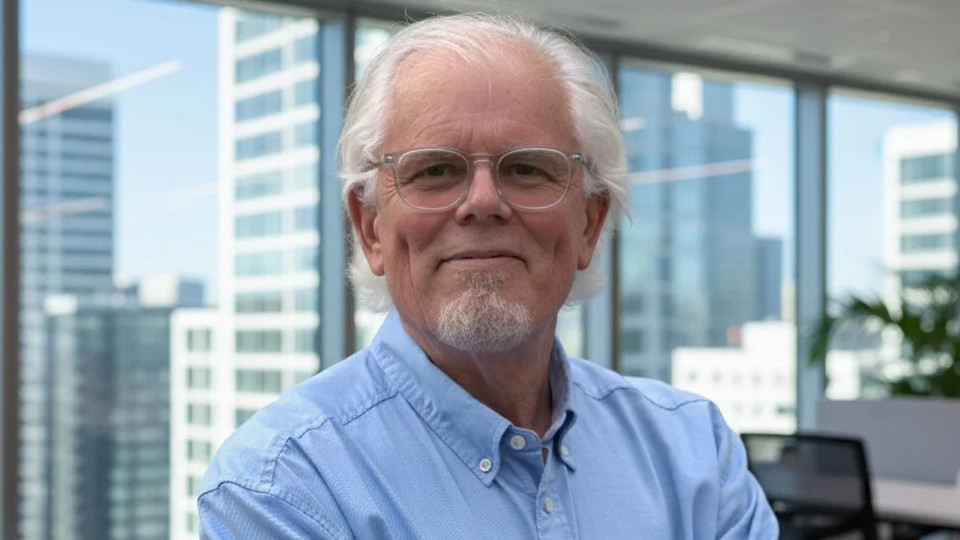
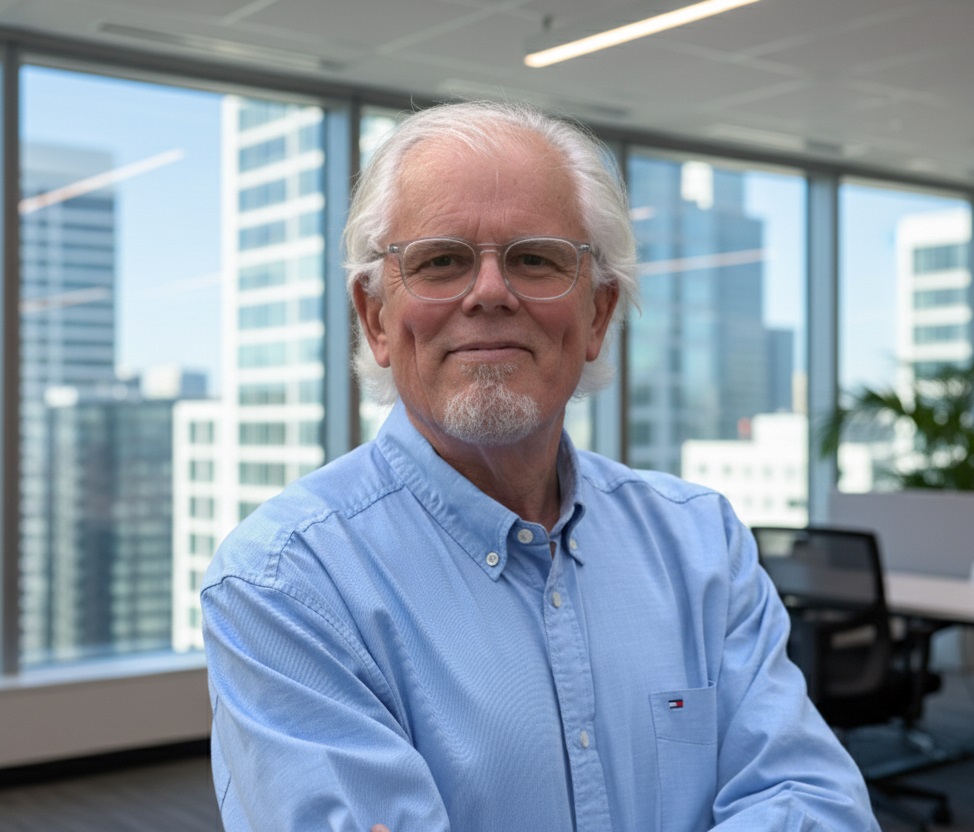
The Financial Management Association International (FMA) has selected Rice Business professor Kerry Back as the recipient of its Innovation in Teaching Award. The honor recognizes outstanding teaching techniques in finance, emphasizing innovation, broad transferability and measurable impact on students, institutions and the profession.
Back was selected for his work in building an MBA course, Generative AI in Finance, which trains students to apply artificial intelligence and coding to finance.
“I view the role of the course as threefold,” Back said. “I want to show students how to use new tools for financial analysis; to show them the ways in which generative AI is implemented in and impacting the finance industry; and to deepen students’ understanding of core finance and related topics.”
“Kerry Back’s selection underscores the exceptional caliber of our faculty,” said Peter Rodriguez, dean of Rice Business, which includes the Jones Graduate School of Business and the Virani Undergraduate School of Business. “Kerry consistently pushes the boundaries of how we teach finance — making concepts come alive and preparing students for successful careers.”
In addition to a talk regarding the course for which he won the award, Back gave a tutorial lecture to several hundred finance professors from around the world on "Integrating AI Into Teaching."
Back’s award places Rice Business among a select group of institutions recognized for innovation in finance pedagogy. With this latest recognition, Rice Business has now secured the FMA Innovation in Teaching Award twice in the last three years — Back and Kevin Crotty were honored in 2023 for their Learn Investments @ Rice Business, which they created to support courses in introductory finance, applied finance, investments, options and futures, fixed income, portfolio management and data-driven finance.
In addition to the national recognition and cash prize outlined by FMA, Back’s work will be featured in the FMA conference program and accompanying materials, giving visibility not only to the individual instructor but also to his impact in teaching innovation in finance.
You May Also Like

Rice University’s Jesse H. Jones Graduate School of Business today announced the launch of its Graduate Certificate in Healthcare Management program, a 10-month, credit-bearing professional credential designed for current and aspiring leaders seeking deep expertise in the business of healthcare.
Virani Undergraduate School of Business provides opportunities for future leaders
The Virani Undergraduate School of Business at Rice University celebrated its one-year anniversary on October 29, with coffee and breakfast for its students as they made their way to class.
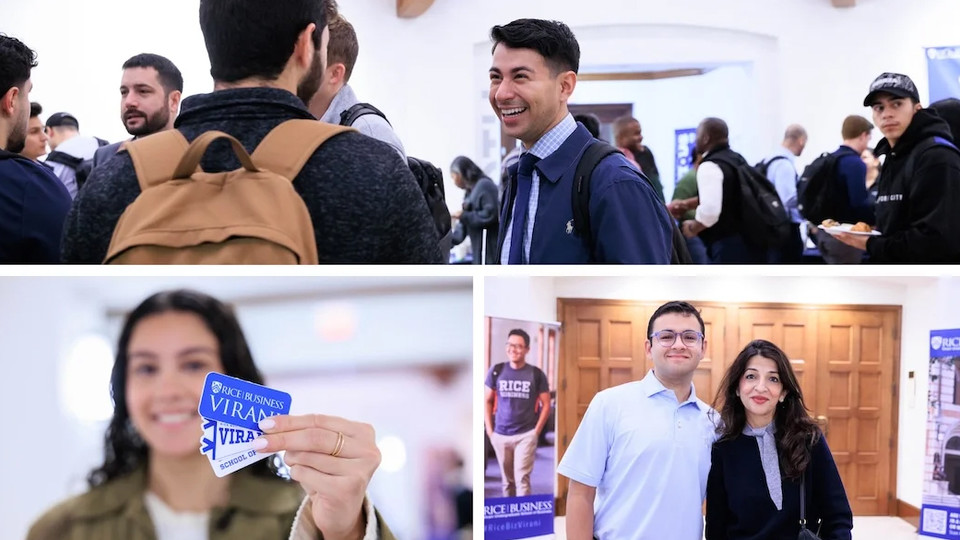
The Virani Undergraduate School of Business at Rice University celebrated its one-year anniversary on October 29, with coffee and breakfast for its students as they made their way to class. The undergraduate program is named after Houston business and community leaders Farid and Asha Virani ’89 thanks to their historic gift in 2024.
“This gift empowers our undergraduates to move beyond theory and step boldly into the real world,” said Bob Dittmar, the Houston Endowment Professor of Finance and associate dean of the Virani Undergraduate School of Business. “It opens doors to internships, research and experiences that shape confident, capable leaders — not someday but right now. We are deeply grateful for the Viranis’ investment in our students’ potential and in the future they will help build.”
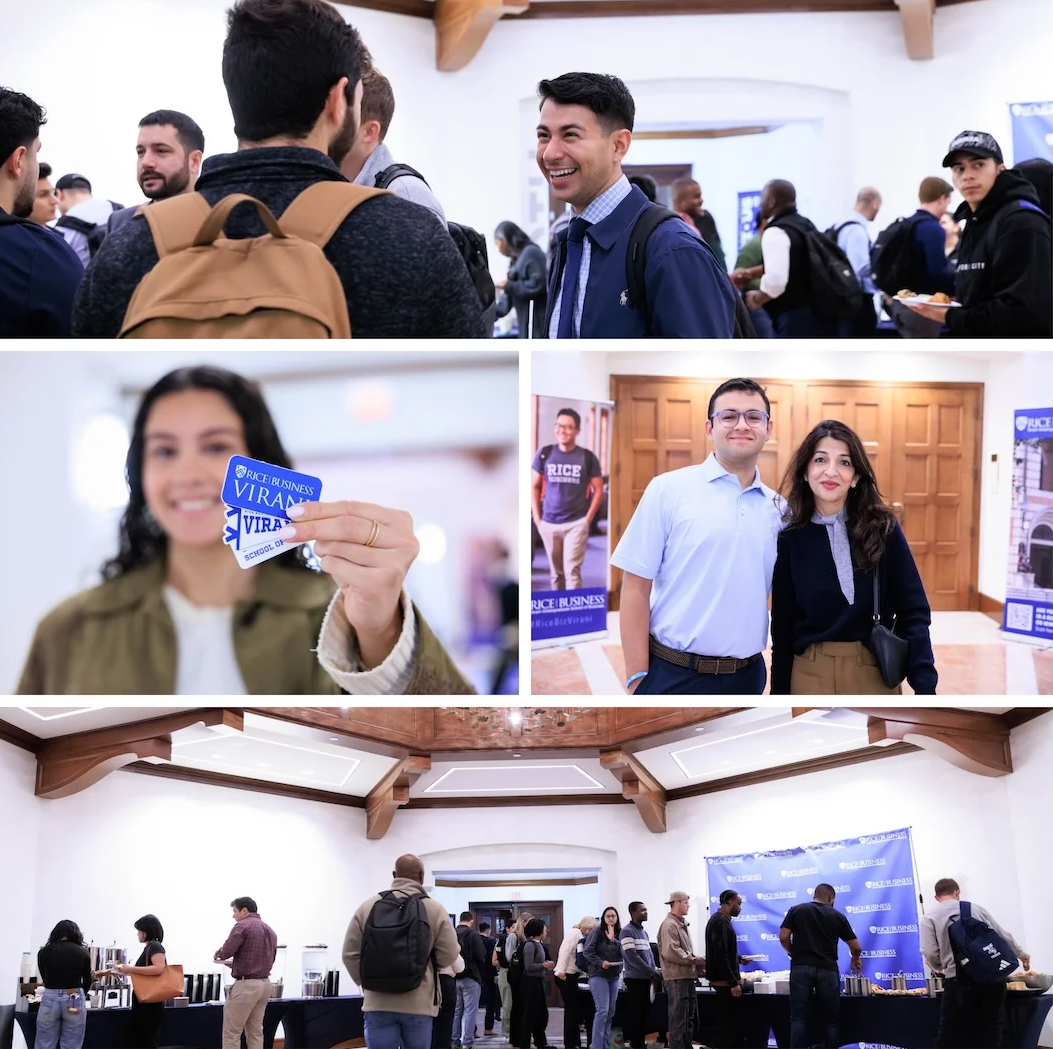
More than 360 undergraduate students are currently declared as business majors at Rice and more than 1,200 are enrolled in business courses. Rice Business leadership is supporting ongoing growth in the number of business majors by advancing opportunities in areas like energy transition, artificial intelligence, nonprofits benefiting society at large, health care reform and the revitalization of urban communities. Those opportunities are already taking shape for the Class of 2024 with 92% of Rice undergraduate business majors finding their postgraduate paths within six months of graduation.
The business major was designed to enable the next generation of business leaders with a well-rounded and in-depth foundation in business fundamentals. The employers of the 2024 undergraduate business graduates include AT&T, the Houston Rockets, GE HealthCare, Capital One and more.
Virani students learn from the same top-notch faculty who teach the Jones Graduate School of Business MBA programs. The tight-knit community means that professors are open to work one-on-one with various research projects, and students can learn from each other as they tackle internships and externships.
In 2024, the Viranis made a generous philanthropic gift to the business program, igniting a new era of opportunity for students. This gift supports undergraduate curriculum development and delivery, cocurricular opportunities and other resources to support undergraduate career readiness and academic success.
“The Virani Undergraduate School of Business prepares students with rigorous scholarship, real-world immersion and leadership readiness opportunities,” Rice Business Dean Peter Rodriguez said. “We are charting an extraordinary future, not just for the school but for the future leaders who study here.”
Rice Business’ new 112,000-square-foot building is set to open in 2026 with additional event space and features new, larger classrooms primarily to support the growth of the Virani Undergraduate School of Business as enrollment continues to grow year over year.
You May Also Like

Rice University’s Jesse H. Jones Graduate School of Business today announced the launch of its Graduate Certificate in Healthcare Management program, a 10-month, credit-bearing professional credential designed for current and aspiring leaders seeking deep expertise in the business of healthcare.
World’s largest, richest intercollegiate student startup competition opens call for graduate founders to compete for $1M-plus in prizes
Now in its 26th year, the Rice Business Plan Competition (RBPC) presented by Rice Business has officially opened applications and is calling on the next generation of world-changing graduate student founders to compete on the global stage. This is where tomorrow’s industry leaders get their start.
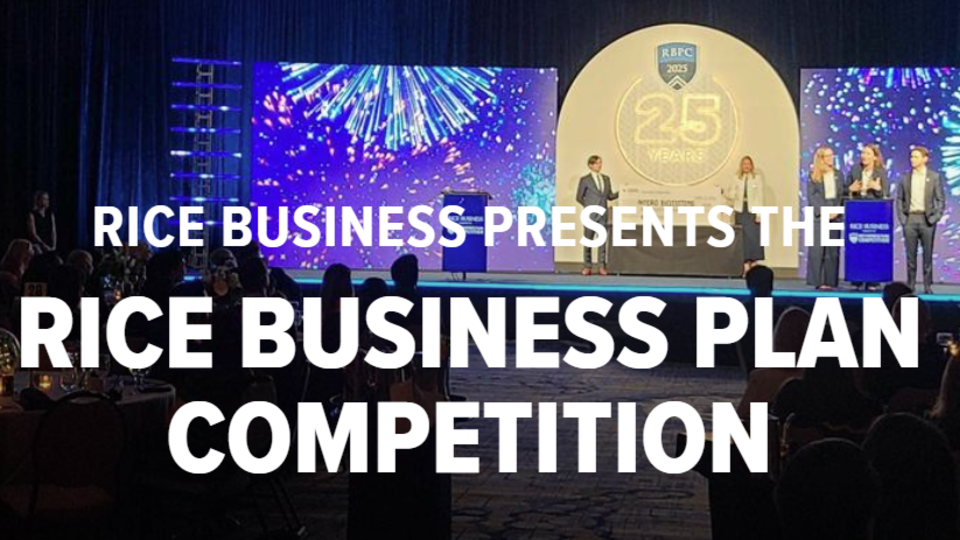
Now in its 26th year, the Rice Business Plan Competition (RBPC) presented by Rice Business has officially opened applications and is calling on the next generation of world-changing graduate student founders to compete on the global stage. This is where tomorrow’s industry leaders get their start.

Hosted and organized by the Rice Alliance for Technology and Entrepreneurship, the RBPC is widely regarded as the world’s largest and richest intercollegiate graduate student startup competition. Over the course of three days, teams pitch to investors, receive mentorship and compete for more than $1 million in prizes. Since its inception, RBPC alumni have raised more than $6 billion in funding, transforming ideas presented early at Rice into thriving ventures making global impact.
Application deadline: Jan. 31, 2026
Competition dates: April 9-11, 2026 | Rice University, Houston
Rice Business — home to the nation’s No. 1 graduate entrepreneurship program for six consecutive years — is a cornerstone of Houston’s rapidly evolving innovation ecosystem. As the global headquarters for the energy and industrial economy, Houston provides a backdrop for the RBPC, where capital, talent and technology converge.
Each spring, the RBPC draws the brightest entrepreneurial talent from universities worldwide to Rice’s innovation hub and to campus in the heart of Houston. Here, collaboration, investment and cross-university connections strengthen both Rice’s leadership in entrepreneurship education and Houston’s growing role as a global innovation city.
Graduate student-led startups from any university are encouraged to apply by Jan. 31, 2026, at rbpc.rice.edu.
To help prospective teams prepare their strongest applications, the Rice Alliance will host virtual information sessions Nov. 13 and Dec. 11. These sessions will offer insights into the application process, eligibility requirements and what to expect during competition weekend.
Teams are initially eligible for the 2026 RBPC if their startup:
- Includes at least two current students with at least one graduate student in any field of study.
- Is fundraising or seeking investment within the next 12 months.
- Is developing a startup in one of the following sectors: energy; clean tech and sustainability; life science and health care solutions; hard tech; digital enterprise; consumer products and services.
For more than 25 years, the RBPC has been the launchpad for founders at the beginning of their journey. The competition does more than award funding — it helps founders accelerate traction, gain visibility, refine strategy and build relationships with investors and corporate leaders who can open real pathways to scale. Graduate student-led teams who are building enduring companies, redefining industries and developing bold solutions to the world’s biggest challenges are encouraged to apply.
You May Also Like

Rice University’s Jesse H. Jones Graduate School of Business today announced the launch of its Graduate Certificate in Healthcare Management program, a 10-month, credit-bearing professional credential designed for current and aspiring leaders seeking deep expertise in the business of healthcare.
When Research Promises the Impossible, Investors Pay the Price
A new study finds that “look-ahead bias” makes trading strategies appear highly profitable in published research, even though they fail in the real world.


Based on research by Jefferson Duarte (Rice Business), Christopher S. Jones (University of Southern California), Mehdi Khorram (Iowa State), Haitao Mo (University of Kansas), Junbo L. Wang (Louisiana State)
Key takeaways:
- Many “can’t miss” option-based trading strategies examined in academic research look impressive on paper because they rely on future data — something no real investor can actually use.
- Once the time-traveling data is removed, those sky-high returns shrink and the risks start to show.
- The pressure to publish big results may help explain why those mistakes were made in the first place.
If something seems “too good to be true,” it probably is — and this old axiom is amplified when money is on the line.
According to new research by Jefferson Duarte, the Gerald D. Hines Associate Professor of Real Estate Finance at Rice Business, investors should be skeptical of investment strategies that promise big returns with little risk — even when they’re published in academic journals.
We all know the sordid tale of Bernie Madoff. The former New York City asset manager lured investors returns that appeared to far outpace the market. For years, he attracted a steady stream of clients with a seemingly flawless performance record. In reality, investor withdrawals were paid using money from new deposits. When the 2008 financial crisis shook markets, Madoff’s $65 billion Ponzi scheme collapsed. Investors rushed to withdraw funds, but there wasn’t enough cash to go around.
Unfortunately, unrealistic performance claims aren’t limited to bad actors like Madoff. Even some peer-reviewed finance papers describe strategies with returns that appear implausibly high.
For an article forthcoming in The Review of Financial Studies, Duarte and his co-authors dug into the details of several influential empirical options papers. And when they tried to replicate their results, they couldn’t. The authorship team found that the option-trading strategies proposed in these papers exhibited “look-ahead bias” — a statistical error that arises when researchers use information that would not have been available when the trading decisions were actually made.
“When we eliminated the intraday data from the analysis, the returns were much smaller, and the level of risk also increased. These were not extremely good deals anymore.”
In layman’s terms, the options trading papers used future data — for example, the average price of a stock or option over the course of a day — to make trading decisions that were supposed to happen at the start of that same day. That’s a problem because, in real life, traders don’t know what the average price will be until the day is over.
So, the authors of these influential empirical options papers were effectively “looking ahead,” using information from the future to make their predictions. This made the results appear far stronger than they would be in reality — essentially giving the strategies an unfair, time-traveling advantage.
One influential study published several years ago claimed that a simple options-based approach could generate astonishing daily mean returns of more than 3%. The strategy involved buying and selling call options — contracts that give investors the right to purchase a stock at a specified price.
To decide which call options to trade, the researchers used filters based on liquidity — how easily a contract can be bought or sold without affecting its price. But their method relied on each contract’s average price over the entire trading day to make selections at the start of that same day — using information that wouldn’t actually be known until after markets closed. When Duarte and his co-authors replicated the strategy using only information available at the start of the trading day, the returns proved far more modest.
“Just imagine profiting a few percentage points per day,” says Duarte. “If you could do that every day for years, you would have a money wealth machine. But in practice, you would need a crystal ball to do this. When we eliminated the intraday data from the analysis, the returns were much smaller, and the level of risk also increased. These were not extremely good deals anymore.”
But why was a paper with such a significant error published in the first place? Publication bias within academia could have contributed. Academic journals favor research that has very strong results, and this can nudge authors to find ways to make their results look stronger than they actually are.
Simply put, if a proposed options-trading strategy did not generate exceptionally high returns, it might never have been published. But a strategy showing smooth gains averaging more than 3% per day is bound to attact attention — even if it isn’t actually feasible.
Duarte’s research examined only three options papers, and he believes there may be more cases of look-ahead bias in the empirical options literature. One concrete way researchers can improve on this is to provide a clear, detailed description of their methods so others can replicate the results.
To reproduce the findings in one study, Duarte and his co-authors had to test 190 different procedures just to figure out how the sample had been selected. If published papers were easier to replicate, he says, it would be far simpler to detect look-ahead biases in the first place.
Duarte also argues that researchers should exercise restraint when selecting their sample. While the use of filters is common in options research and can help remove data errors, they also create opportunities for mistakes — such as look-ahead bias — to slip in.
And if any options strategy appears to outperform the market by a wide margin, it should invite additional scrutiny. Exceptional risk-adjusted returns may signal that an error in the empirical analysis has gone unnoticed.
“When you talk to practitioners — people that actually implement these option strategies,” Duarte says, “they will tell you that these high risk-adjusted returns simply can’t happen on a consistent basis. When they try to replicate a strategy like this, they can’t do it either.”
Written by Ty Burke
Duarte, et al (2025). “Too Good to Be True: Look-ahead Bias in Empirical Options Research,” forthcoming in The Review of Financial Studies.
Director of Real Estate Initiatives
Never Miss A Story
